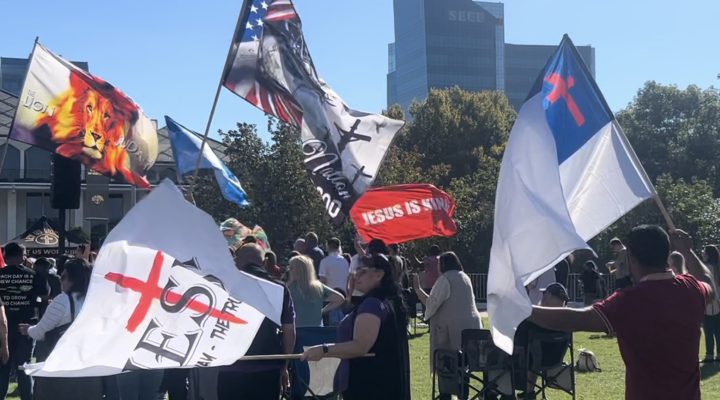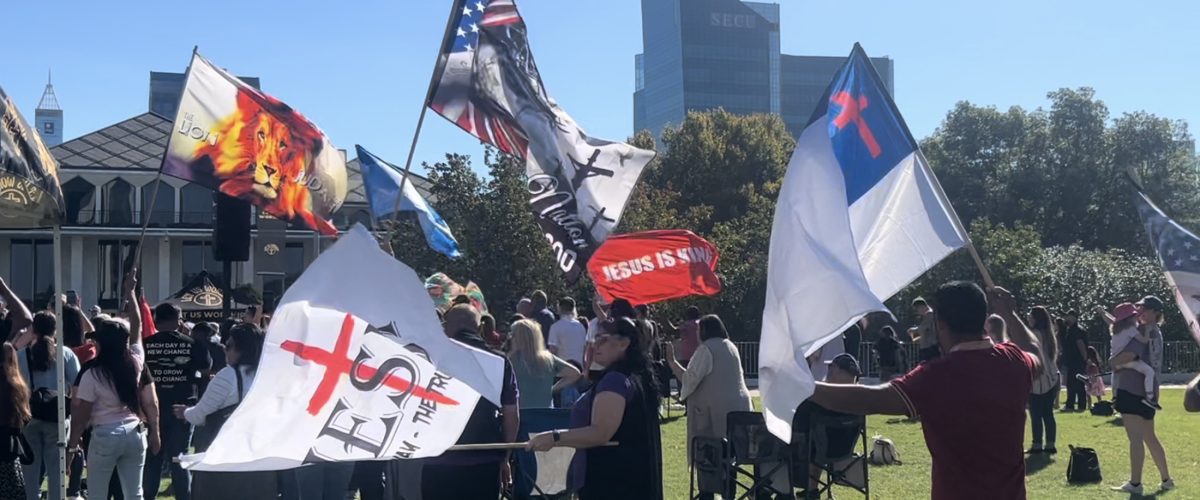The juxtaposition of experiencing the “Kingdom to the Capitol” tour followed by the “Faith and Democracy” tour in North Carolina on Sunday was a contrast in theology and politics that demonstrates the fracturing of American Christianity unlike any pairing of events in a single day I’ve witnessed.
Sean Feucht’s “Kingdom to the Capitol” worship tour evolved out of his worship protests of COVID lockdowns in 2020, when he targeted locations where Black Lives Matter protests were happening. Since then, he has staged worship events in front of state capitol buildings, as well as annual gatherings at the U.S. Capitol in Washington, D.C. The event I attended on Sunday was in Raleigh, N.C., his 49th state capitol event of the current tour.
After Feucht’s event wrapped up, I drove from Raleigh to Greensboro for the “Faith and Democracy” tour, which is being organized by Diana Butler Bass, Jemar Tisby, Kristin Du Mez and Robert P. Jones. While the four of them have known each other for years, they recently started a weekly Substack and podcast together called “The Convocation.” So they decided to host a couple of in-person events as the 2024 election nears.
In an interview with BNG, Du Mez said: “When I travel around the country, I love meeting people at events. But so many people feel alone, isolated. Doing this work publicly has its downsides, but one benefit is that we are connected to others doing the work. This is so important. One of our goals is to work to connect people with each other in their local communities. There are so many incredible people doing incredible things. We need to find ways to connect these people to each other. I don’t think we’ve cracked this code yet, but this tour is one attempt to do just that.”
Their event Sunday was hosted by First Baptist Church of Greensboro. Unfortunately, Jemar Tisby was not able to be present. In addition to the scholars, they also had music by Sam Ashworth, Taylor Leonhardt, Rissi Palmer and Tommy Sims.
They have another event planned for October 20 at Dayspring United Methodist Church in Tempe, Ariz., with music from Leonhardt, Sims and Fernando Ortega.
While both the “Kingdom to the Capitol” and the “Faith and Democracy” tours are organized by Christians who say they want to faithfully engage theology and politics, my experience at each of them could not have been more different.
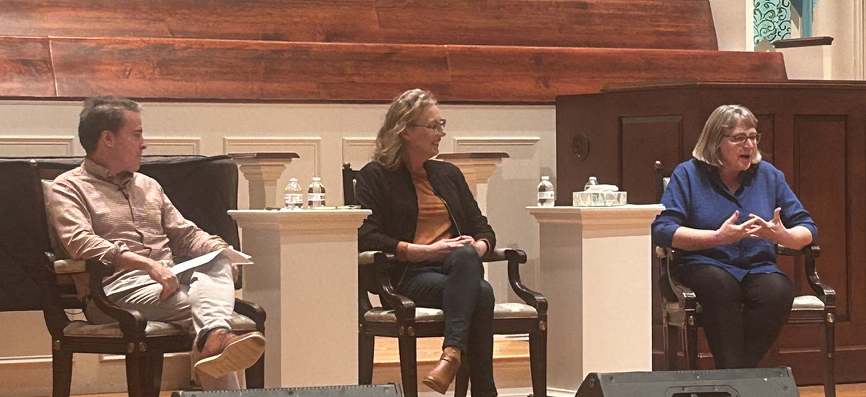
Robert P. Jones, Kristin Du Mez and Diana Butler Bass
The Johnson Amendment
As I drove up I-85 to Feucht’s event, I listened to his latest podcast episode, which was a conversation with Mark Driscoll, the pastor who was ousted for abusing his church in Seattle only to start another church in Scottsdale, Ariz.
During their conversation, Feucht called the Johnson Amendment, which prohibits nonprofit organizations from campaigning for a politician, a “sham” and “fake” and said, “They don’t enforce it.”
Driscoll added, “I’m a Christian, conservative Republican, in that order. And so I’ll be voting for the Republican nominee. I mean, there you go. And what’s going to happen to me now is nothing because the Johnson Amendment, you know, it’s never been applied and it’s never been tested.”
It doesn’t seem to dawn on either of them that perhaps this lack of enforcement — which is true — is a sign of Christian privilege in the United States.

Sean Feucht
The two men went on to complain about Al Sharpton, Jesse Jackson, Martin Luther King Jr., Stacey Abrams and Raphael Warnock and said, “As long as it’s the Black church … nobody has any problems.”
According to Driscoll, “If you’re Black or liberal, that’s not a problem. If you’re conservative, that is a problem. … Not that I even care about the Johnson Amendment.”
Feucht said he intentionally mixes worship and politics at his events. “We need to start blending these areas together because we believe all this crap of the Johnson Amendment, the separation of church and state, which was meant to protect the church from the state, not the other way around.”
So it was interesting later that evening when Jones opened the “Faith and Democracy” tour by saying: “One quick disclaimer. We are in a church. And we are having a nonpartisan conversation tonight. We want to love what it means to have separation of church and state, obey those democratic norms in this space. And that’s a bigger conversation we need to have far beyond the next few weeks. It’s a much longer term conversation for us to have.”
After the event, Du Mez and Bass also mentioned to me their careful attention to follow the Johnson Amendment throughout the evening’s conversation.

Shouting vs. listening
One of the most glaring differences between the two events was simply the volume.
The “Kingdom to the Capitol” tour had a full band with a very large professional sound system. I literally felt the bass drum pulsing through my body for nearly three hours straight.
Feucht yelled, “This is not a concert! This is not a nice CCM worship event! We have come to wage war in the Spirit! We have come to shift an atmosphere!”
To shift the atmosphere, he declared, “We’re going to release a sustained shout for three minutes!” And then the entire gathering began screaming and blowing shofars.
One of Feucht’s favorite songs to sing at these events is “I Raise a Hallelujah,” in which the worshipers say they’re going to sing “louder and louder,” that their praises will “roar,” and that they’re going to sing louder than the unbelief of their enemies. Originally, the song was written as a response to a child who was facing a life-threatening illness. But at Feucht’s worship events, the song carries a more political vibe.
My ears were still ringing when I walked into the quiet sanctuary of First Baptist Church in Greensboro. Instead of jumping, dancing, screaming, falling down and waving flags, everyone was sitting still and perfectly quiet. And there wasn’t a flag in sight.
“Listen, listen while the storm in your heart is raging, listen, listen, listen,” Sam Ashworth quietly sang, almost in a whisper accompanied by his acoustic guitar. “Listen, listen to the message of hope and the and the whispers of ghosts, listen, listen, listen.”
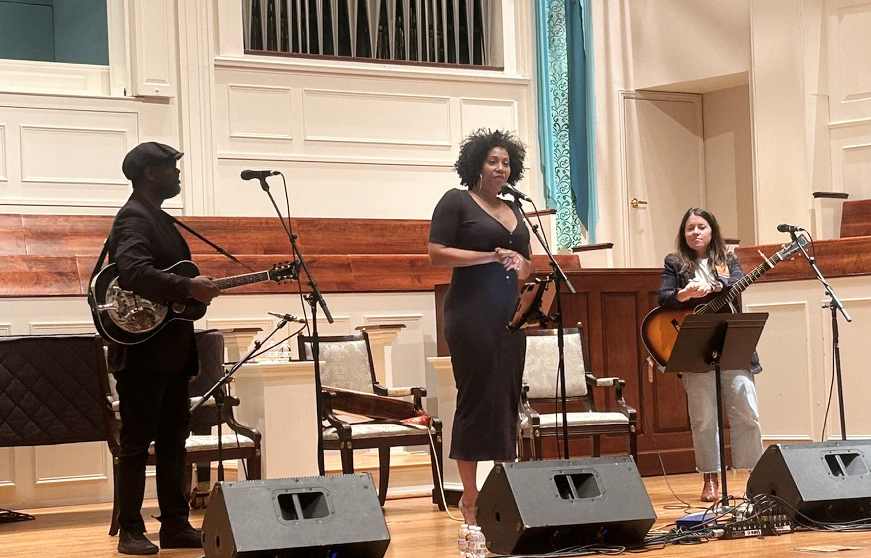
Musicians at “Faith and Democracy” event.
Responding to Hurricane Helene
While they have been looking forward to hosting the “Faith and Democracy” tour, First Baptist Church of Greensboro has spent much of its energy over the past few weeks helping their neighbors in Asheville, N.C., recover from Hurricane Helene. They have collected food, water, clothing, cleaning and hygiene supplies in partnership with the Cooperative Baptist Fellowship and First Baptist Church of Boone, which has become a hub and feeding station for students and others in the surrounding area.
According to the church’s website, their desire is to be a generous part of “the ongoing work of relief and restoration.”
But while Feucht’s “Kingdom to the Capitol” tour drove into Asheville to lead worship for Revol Church with Operation Blessing on the way from their event in Atlanta to the gathering in Raleigh, they spoke about their vision for Asheville more in terms of engaging in worship warfare.
“The flood hit Asheville, a place that’s famous for being New Age and witchcraft,” Feucht declared from the stage in Raleigh. Later, he added, “I’m frustrated as I just came from Asheville to see what I’ve seen. I don’t even want to get into it. It’s crazy.”
Feucht also took the opportunity to criticize FEMA, which has become so common among Donald Trump and his conspiracy theorist supporters in the aftermath of Hurricane Helene that the National Guard has confronted two trucks of “armed militia saying they were out hunting FEMA.” According to the Washington Post, this has led to FEMA one day last week ordering its workers in Rutherford County to “stand down and evacuate the county immediately.”
“Feucht also took the opportunity to criticize FEMA, which has become so common among Donald Trump and his conspiracy theorist supporters.”
Because Feucht uses worship as a weapon of spiritual warfare, his team set up a stage in Asheville and began blaring their worship music. While they were part of Operation Blessing’s plan to provide aid, their primary goal was to wage spiritual warfare through worship aimed at fighting off demons, rather than simply seeking to provide relief and restoration as loving neighbors.
Feucht told the worshippers in Raleigh, “We began to worship and all these folks came down from the mountains.” He added, “And these are not church folks.”
“There’s not a spell or a curse that’s too weighty to overcome the blood of Jesus,” Feucht said. “And so we declare the blood over North Carolina.”
Apparently, some of the people in Asheville who lost family members and friends and homes weren’t interested in having blood declared over them.
“They had a damaged mindset of who God was. I can tell it,” Feucht recalled thinking about them. “They felt like he was a mean old man, a Gandalf, sitting in his rocking chair waiting to beat them down with religion and that he was a father that was ashamed of them.”

Flag seen at “Kingdom to the Capitol” event.
Apparently, Feucht knows very little about The Lord of the Rings too.
Then he began quoting from Isaiah 49 because North Carolina is the 49th state of his current worship tour. And as Feucht sees things, this was ultimately a message of hope.
“I said, ‘No, this is the moment when God’s reframing what a father looks like. And in this moment of your desperation and in this moment of loss and heartache and hopelessness, he’s standing in front of you with his arms wide open,’” he countered to the people of Asheville. “And you know what, the love of God is breaking in now to say to the captives, ‘Come out!’ and to those in darkness, ‘Be free!’”
Thus, while the neighborly love of First Baptist Church of Greensboro is about bringing relief and restoration to the people of Asheville, the worship warfare of Feucht is about loudly confronting them with calls to become evangelicals. It sounds hopeful because it’s about a father waiting with open arms. But it’s an attempt to coerce people into submitting to a hierarchy.
The worship of hierarchy
As Jones opened the discussion at the “Faith and Democracy” tour, he pitched the vision of a different kind of Christianity. He defined a more healthy, democracy-friendly Christianity as “one that is centered on love rather than fear, one that is centered on equality rather than hierarchy, one that is centered on pluralism rather than propaganda, and one that is centered on truth rather than dominion.”
Similarly, Du Mez began her remarks by sharing her background in studying Nazi Germany. Fifteen years later, when she began focusing on evangelical masculinity, she noticed “seeing this hierarchy and authority, submission and power dynamics.” When she began recognizing the same language used in Christian nationalism, she thought, “If I didn’t know any better, I’d almost think this is authoritarian.”
After she wrote a piece in January 2017 on the topic, she heard from a scholar of Nazi propaganda who asked her, “Did you realize that a lot of those quotes you have in there sound an awful lot like the 1930s German Christian movement?”
Earlier, at the “Kingdom to the Capitol” tour, Feucht invited a group of evangelical pastors to start the gathering in prayer. With the tension in the music building, in a scene reminiscent of a pre-battle speech in Braveheart, the pastors yelled:
- “We declare the lordship of Jesus over this city. We declare the lordship of Jesus over our government.”
- “The kingdom of God is advancing in North Carolina like never before because Jesus is King!”
- “Heavenly Father! Your kingdom come! We deny the right of any other kingdom to prosper in North Carolina!”
Notice how hierarchical theology produces hierarchical politics that are incompatible with democracy. God is defined at the top of the hierarchy in a position of being the king and lord. God’s kingdom is advancing specifically in North Carolina. And thus, anyone who won’t submit is defined as a different kingdom and denied the right to prosper in North Carolina.
“Notice how hierarchical theology produces hierarchical politics that are incompatible with democracy.”
“People are like, ‘Come on, Sean, that’s so political.’ And I’m like, ‘Hold on a sec. This is actually biblical!’” Feucht said. “Did you know that David, who was a politician by the way, he was a worship leader and a politician. But when he took over as king, he said, ‘I do not want to rule over my nation unless the presence of God is in the center of it.’ Well, David, that’s a little bit of a Christian nationalist, don’t you think? Exactly! And David brought the ark of the presence into the capitol city.”
Feucht’s pursuit of Christian nationalist politics actually is driven by his theology of worship, where his worship events are bringing the ark of the covenant into capital cities.
“It’s not just a battleground politically. It’s a battleground in the spirit” he explained. “Sometimes it takes the church a long time to figure out what the world already knows. Maybe there’s something God wants to unlock in North Carolina. It’s not just about politicians pushing their platform. It’s about God saying, ‘Who’s going to be enthroned over this state?’”
Even a simple theme such as hope was talked about in hierarchical terms. To the Christians, Feucht said, “You are a prisoner of hope. You are chained to hope.”
This is why his choice of songs focused on God reigning from above, and why he defines praise as “releasing the authority in our mouths.” It’s a way of enthroning God over the state of North Carolina in a way that puts Christians in positions of authority and denies the right of anyone who won’t submit to prosper and defines the supposedly free as being chained.
Hierarchy and persecution
At the “Freedom and Democracy” tour, Jones suggested: “I don’t think white Christians have much experience with struggle. And what that does is that we get discouraged really fast. So we start working and we realize, ‘Oh wait, this is hard. People are saying bad things about me. And people are mad.’ … No Christian of color thinks like that.”
His words were especially humorous and true for me as I remembered back on how the “Kingdom to the Capitol” tour opened earlier that afternoon. Feucht originally advertised that his gathering would take place outside the Capitol building. But then they had to move the event two blocks away.
“Thank you for walking a mile, some of you, to get here,” Feucht began. “The capitol, at the last minute, we had to change venues to be right here.” Later he added, “I’m sorry you had to park so far. It wasn’t my fault! Blame your capitol!”
We literally had to walk just two blocks.
Of course, both these events require money to produce. They each depend on people donating money to fund the costs. But while the “Freedom and Democracy” tour simply saw this as a normal part of hosting events, Feucht seemed to view it as persecution.
“They would rather accommodate drag queen story hour than Christians worshiping Jesus.”
“This is the most exhaustive, expensive, difficult journey,” he said. “I miss COVID days when we just set up wherever we wanted and called it a protest. Now we gotta get permits, we gotta get security, we gotta get moved two blocks down the street last minute. I mean, we got bureaucracy. And the thing you know about these capital cities, I can say this because I’ve been to 49 of them now, they’re more resistant to the gospel. They would rather accommodate drag queen story hour than Christians worshiping Jesus. … They made me pay, every hundred people they made me hire two state troopers.”
Again, the “Freedom and Democracy” tour also hired security personnel. But Jones, Du Mez and Bass weren’t on stage going on about it being a sign of persecution.
Hierarchy and belittling others
Perhaps the most difficult part of attending Feucht’s “Kingdom to the Capitol” tour was noticing how the theology and language of hierarchy boosted Feucht’s ego and led him to belittle others.
“This is why I became the No. 1 COVID violator in 29 states,” Feucht declared while laughing. “This is why I have hundreds of thousands of dollars in lawsuits. This is why we encountered resistance from Antifa and government officials and power-drunk politicians. Because we’re not going to stop doing what the church has been doing for 2,000 years. We don’t care if it’s a pandemic. We don’t care if it’s an election. We don’t care! We’re not going to stop!”
Then he added to the people who are still recovering from Hurricane Helene, “So some of y’all North Carolinians, you’ve got to get that grit back.”
Feucht also loved talking about how many state capitols he’s been to. At one point, he said, “If you don’t exercise your religious freedom, you’ll lose it. OK, I can say that because I’ve been to 49 capitols. And when you go to 49 capitols, you’ll understand what I’m talking about.”
Of course, no one in attendance will ever have the money and musical talent to travel to 49 capitols and host Christian nationalist worship events. So apparently, none of us can possibly understand like Feucht does.
When he began confronting hypothetical sin in the worshipers, Feucht said, “You could’ve picked up some ungodly paradigms through church hurt.”
He went on: “You are so bound up in a spirit of offense. I saw this. I saw it like a snake wrapped around you.”
He went after LGBTQ people. “There are some people here who have battled with confusion around your identity. In every single capitol, in every single city, I go after this because it’s taking out an entire generation. The studies right now are showing that 25% of Gen Z is confused about how they were made. … God did not screw up when he made you. …If you’re here and you’ve battled any of that confusion that’s been propagated by the world or by education or by any of these perverted systems that have come to attack your identity, just be bold and lift your hand if that’s you.”
“Feucht asked for LGBTQ people to walk forward so the crowd could surround them and declare their sexual identity over them.”
Then Feucht asked for LGBTQ people to walk forward so the crowd could surround them and declare their sexual identity over them, suggesting, “They’re going to beat back the lies of the enemy.”
The love around a table
On the other hand, one of the most powerful themes of the “Faith and Democracy” tour was about how a Christian theology of the table affects our experience of democracy.
Jones shared an illustration of his memories about a set of dining room chairs around a table. “It has six chairs. But one of the chairs is different than the rest,” Jones described. “It’s made in the 1940s. And that chair can only fill the end of the table. It won’t fit around the sides. It is called the captain’s chair in these architectural terms. And it was made for the male head of household to sit at the end of table to preside over family dinner.”
Then Jones reflected: “I think it’s a good metaphor for the way white Christians in this country have thought of ourselves. … Yes, some other people can come and bring up a chair. But we own the table, and we’re sitting at the head of the table.”
The Table is a theme that is dear to the heart of Bass, who is a member of the Episcopal Church. She noted how the table shouldn’t be a hierarchical “top and bottom table,” but a “round table,” and “an ever-expanding table.”
For Bass, the table is a great way to understand democracy as well.
“When we talk about the table, the table can actually become a place of great sharing and malleability and openness,” she said. “And when we talk about it in terms of democracy, it’s a vision of society as a table.”
In this metaphor, participation in a democracy is not about making yourself, “the head of the table, but instead, pulling up more chairs to the table.”
Bass recommends reading poetry, especially from “women poets of color and poetry written by lesbians.” She spoke of her own experience being deeply moved by these women and said, “What happens is you get this other view into words and the world that’s sort of startling.”
But very few things were more startling to me than experiencing Feucht’s serving of Communion at the “Kingdom to the Capitol” tour earlier that day. This is how he introduced the most holy liturgy of the Christian church:
“I was getting ready for a fight. As we go to these capitols, I’m like, we’re going to have to get lawyers, which we had to get. We’re going to have to get contracts. We’re going to have to threaten governors that if they don’t let us do what the church has done, then they’re going to be in trouble. And we’ve had to do that. And so I was ready for a fight and I had my like intercessor face on. … The more constipated you look, the more intercession’s happening. … The Lord was like, ‘Hold on, hold on, Sean. You’re not going to win the battle in a way in which you fought in the last season.’ He says, ‘You’re going to win it on your knees taking Communion.”
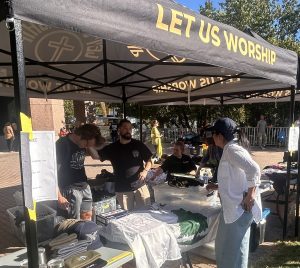
Merchandise table at “Kingdom to the Capitol” tour with “Appeal to Heaven” flag draped over table.
Then he said, “If you’re a nonbeliever, this is not for you.”
And as Feucht knelt on the stage while holding up the cup representing Jesus’ blood, draped over the speakers in front of him was a large “Appeal to Heaven” flag, a white flag with an evergreen tree in the center and “Appeal to Heaven” written across the top.
As Bradley Onishi and Matthew Taylor wrote for Rolling Stone, while the flag originated during the Revolutionary War, it is now “a symbol of Christian extremism animated by modern-day apostles, prophets and apocalyptic visions of Christian triumph that was central to the chaos and violence of January 6.” They add that this flag “connotes an aggressive form of Christian nationalism,” which Baylor University communications professor Leslie Hahner says is a movement “connected to, if not an outright embodiment of, ideologies of white supremacy.”
As Feucht served Communion with the “Appeal to Heaven” flag draped over his speakers and his merchandise table, he sang, “Oh precious is the flow that makes me white as snow.”
Telling the truth
With the aggressive, well-funded worship warfare of Feucht’s “Kingdom to the Capitol” tour entering its fifth year of operations, it’s important to have events like the “Faith and Democracy” tour to speak the truth in response.
“There is truth. And there are falsehoods,” Bass noted. “And part of the job of a Christian is to figure that out and to do that kind of conversation in community.”
For her, this means discussing issues in ways “that are demonstratively true, that are connected to the deep nature of the universe.”
For Du Mez, it means recognizing how sin creates the need for democracy.
“Understanding the capacity for sin is actually a really good argument for democracy because if you believe that people have the capacity for great evil, if you give one person or a small group of people a whole lot of power, they are likely to use that to their own advantage and to abuse that power,” she explained. “And the thing about democracy is we can kind of spread out the selfishness. And hopefully also appeal to the common good and the image of God … but there’s some guardrails there.”
But for Christians to speak into this conversation, it means facing their own complicity in the exile that has been caused by white supremacist hierarchies.
Speaking of Southern Baptists, Jones said: “Our tradition, from whence we came, was founded in 1845 to make enslavement of other people on the basis of the color of their skin compatible with the gospel of Jesus Christ. That is the genesis story of the Southern Baptist Convention which then came to be the largest Protestant expression of Christianity this country has ever seen and remains so to this day. So no wonder we’re struggling.”
Shining your light
Despite their very different theology and politics, both events ended on the same metaphor.
As Feucht closed his “Kingdom to the Capitol” event in prayer, he said: “We pray, God, that you would ignite a movement in this capital city that would shift this state. We pray that God would raise them into places of authority. Lord, no longer will the church run and hide from the political realm. But this is a season to let our light shine. No longer will we run from university campuses. We’re going to let our light shine! No longer will we flee from places of culture. … We’re going to let our light shine!”
Notice the language. To Feucht, shining a light means being elevated into places of authority and invading territory with shouts of war that deny the right of any other kingdom to prosper.
In other words, shining the light of worship warfare is by definition a direct assault on democracy.
A few hours later, the “Faith and Democracy” tour ended with everyone singing “This Little Light of Mine,” with the line: “When I see my neighbor coming, I’m going to let it shine.”
But nowhere at their gathering was there any talk of posturing yourself over your neighbors. Instead, there were three scholars and four musicians sharing how their theology inspires them to pull up a seat for their neighbors, listen to their neighbors, and then grieve and repent for any hurts they’ve caused while actively working toward relief and restoration.
For the “Faith and Democracy” gathering, letting your light shine means embracing your neighbors in relationships of love rather than fear, equality rather than hierarchy, pluralism rather than propaganda, truth rather than dominion.
And perhaps Taylor Leonhardt shared it most beautifully in her song “If We Ever Get To Heaven.”
How many thoughts and prayers will you offer
Before you admit
It was never about the children
When there’s wars to be won
And there’s ground to be gained
In the name of the holy kingdom of the gun?
But if you ever get to heaven
Take a look around the place,
God took your AK-47s
And he turned them into spades.
And he’s been planting some lilies
In the killing fields
While we’re all still waiting
For our wounds to heal.
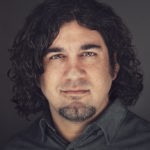
Rick Pidcock
Rick Pidcock is a 2004 graduate of Bob Jones University, with a bachelor of arts degree in Bible. He’s a freelance writer based in South Carolina and a former Clemons Fellow with BNG. He completed a master of arts degree in worship from Northern Seminary. He is a stay-at-home father of five children and produces music under the artist name Provoke Wonder. Follow his blog at www.rickpidcock.com.
Related articles:
Bullshit | Opinion by Justin Cox
Thousands pray, worship and talk politics at ‘Million Women’ event

